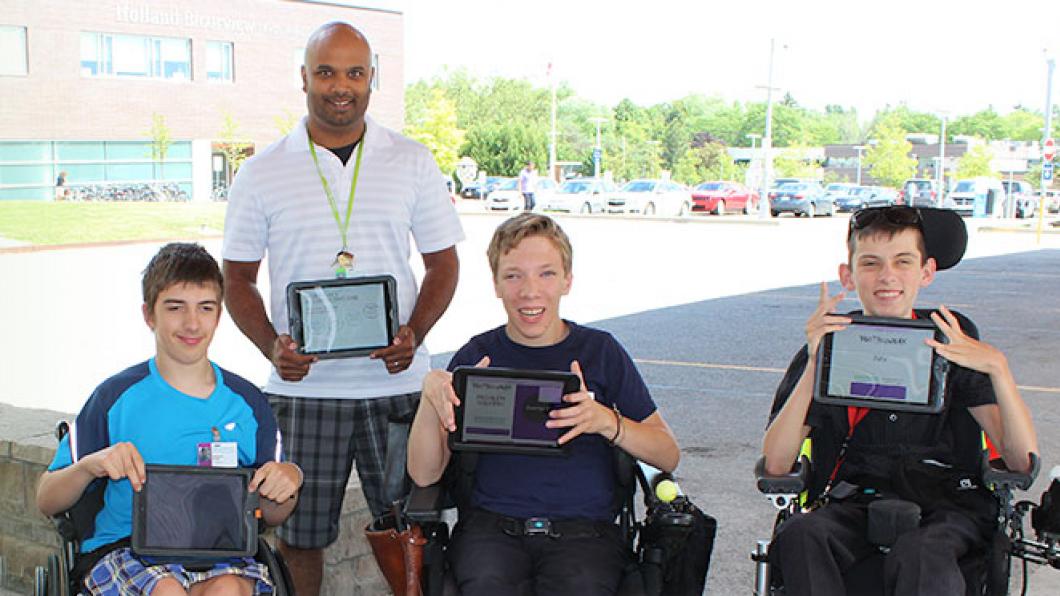
Independence program ignites futures
Do you remember when you first moved out on your own? Sure you were excited, but be honest, deep down you were also a little nervous.
For youth with disabilities, taking this big step can go beyond nervous to overwhelming. Many don’t feel ready to handle the responsibilities of living on their own.
So every summer, The Independence Program (TIP) at Holland Bloorview works with a group of young adults with physical or cognitive disabilities learning how to live away from home by staying at a university or college residence for three weeks.
TIP participants are between the ages of 17 and 21. Some of the participants plan on attending university or college while living on campus, while others plan on working and living independently in the near future.
The three weeks at T.I.P. are filled with workshops on how to buy groceries and prepare meals; how to manage money; how to safely take public transit; how to direct an attendant for care needs; and other independent living and social skills.
“TIP allows participants to be in charge of the own care, take calculated risks, and make decisions for themselves,” explained Andrea DeFinney, a Therapeutic Recreation Specialist and TIP coordinator. (Participants are supported by onsite therapists, nurses and support workers, so their safety is never compromised, noted Andrea.)
Goals before going solo
Before participants are handed their room keys, they meet with TIP coordinators to establish meaningful and personal goals.
For some it’s better time management. For others, it’s money management. Other goals include doing laundry, building friendships, or learning about community resources.
With goals set, the program begins and on that first day there is noticeable nervousness, and maybe even a few tears. But it makes their completing the program and accomplishing their goals that much more satisfying, believes Andrea.
New roof, new roomie
For some participants, it’s the first time they’ve spent the night outside their family home. It’s a big shift mentally and socially.
To start, all participants live with roommates. That alone can be a very new experience. Next, participants work with personal support workers they’ve never met before. That’s another challenge, especially if they are accustomed to only receiving care from parents.
“Mom and dad are not always going to provide care, so they grow from having the opportunity to practice how to direct their care in a realistic setting,” said Brenna Buchanan, a Life Skills Coach and a TIP coordinator.
Planned urban adventures
Later in the program, participants put their newfound skills in action for “City Survival.”
City Survival is an experienced based program where each participant picks a downtown location that they want to explore. “The participants are fully responsible for planning and executing that day,” said Andrea. “They choose the location, call the location to learn their hours, the price of admission and if they’re wheelchair accessible.”
“This is where a lot of learning happens,” she continued. “The staff has a conversation with the participant to decide how much support is needed. Some say ‘I want you to be a shadow,’ while others say, ‘I don’t want you to help me with anything, unless you are concerned about my safety.’”
With everything planned, the participant and staff member venture out.
“It’s really a highlight for the youth, because it’s very personal. It’s a huge accomplishment when they do it,” said Brenna.
TIP transformations
When the program wraps up, TIP coordinators are amazed at the transformations they’ve witnessed. With boosted self-confidence and a new “can do” attitude, youth talk positively about their future like never before.
“TIP helps them realize their hopes of living on their own, or being more independent within their family home, are achievable,” said Brenna. “You see that realization. You can see the excitement in them afterwards.”
“Living somewhere else without your parents, being responsible for all these things, the social experience from being with other youth going through the same experience…it’s transformational,” said Andrea.
The Independence Program (TIP) is generously supported by donors like you. In addition to donor support, TIP partners with Gage Transition to Independent Living (West Park Healthcare Centre) and works with a number of volunteers to make TIP a success.
TIP runs from July 24 to August 12. For more information about TIP, contact Michelle Halliday at mhalliday@hollandbloorview.ca or at 416 425 6220 ext. 6216 / Steph Di Martino at sdimartino@hollandbloorview.ca or at 416 425 6220 ext. 3817.